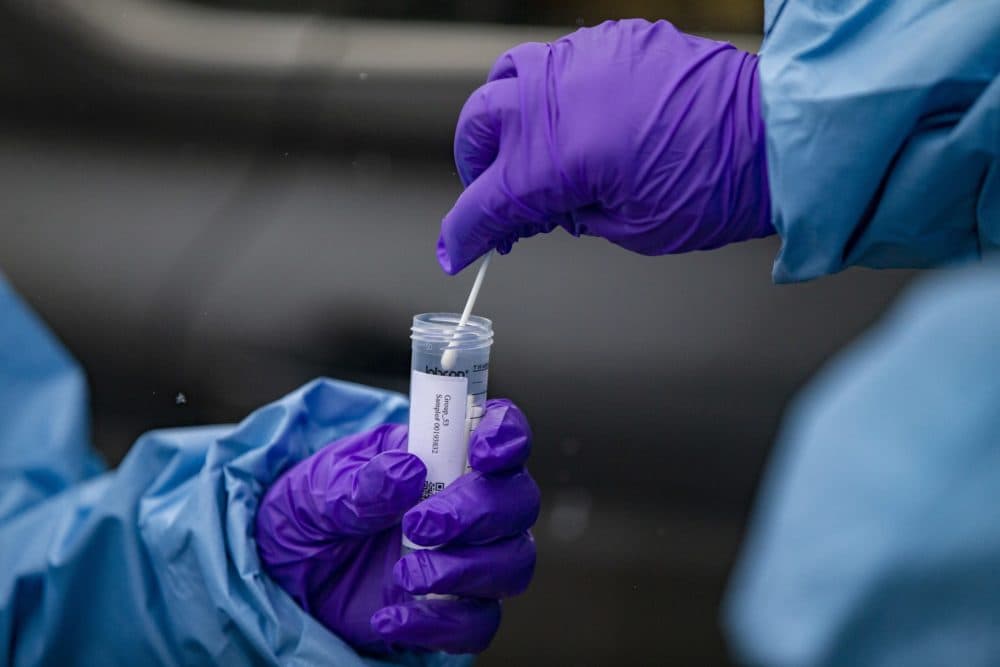Advertisement
Coronavirus Coverage
Massachusetts to close free COVID testing sites, citing declining demand

Massachusetts health officials are planning to close the last 11 state-funded COVID testing sites at the end of March, marking another turning point in the state’s pandemic response.
These sites provide free PCR tests regardless of insurance coverage, even for people without symptoms or a known exposure to COVID. PCR tests are considered the most accurate way to diagnose COVID, particularly for people without symptoms.
State testing sites have provided more than 4.3 million swabs since July 2020. But demand has dwindled. The sites performed fewer than 1,000 COVID tests per week in February, according to officials at the Department of Public Health, down from about 12,000 tests per week last summer.
Last spring, the number of free testing sites shrank from 41 to 11. The remaining sites — in Everett, Framingham, Lawrence, Lynn, New Bedford, Randolph, Revere, Springfield and Worcester — will close March 31.
State health officials said the closures reflect a shift toward treating COVID more like other respiratory illnesses.
"As we move into a new chapter of living with COVID-19, this large-scale state-funded PCR testing is no longer the best use of resources," officials said.
People who need PCR tests — which are processed in laboratories — can still obtain them at pharmacies, urgent care centers, primary care offices and community health centers. But insurance coverage for tests could depend on whether a person has COVID symptoms or meets other criteria.
Rapid antigen tests, which can be used at home and report results within minutes, also are available at stores and pharmacies. Health insurers are required to cover the costs of eight rapid tests per person per month, but that rule expires on May 11 when the national public health emergency — in place since the early days of COVID in 2020 — is scheduled to end.
The state’s biggest health insurers, Blue Cross Blue Shield of Massachusetts, Tufts Health Plan and Harvard Pilgrim Health Care, told WBUR they have not yet decided whether to cover the costs of these tests when the federal requirement ends.
Advertisement
Free antigen tests are still available through the federal government: U.S. households can request four rapid tests through this program, while supplies last.
Some health experts are concerned that the upcoming state and federal policy changes could make it harder for people to quickly access and pay for COVID tests. This has broad implications for preventing COVID transmission, according to researchers at the Kaiser Family Foundation.
"We should think about this in terms of equity," said Bill Hanage, epidemiologist at the Harvard T. H. Chan School of Public Health, in an email. "People who can’t afford to pay for tests will be less likely to get them, and so more likely to risk exposure.
"We should still make sure that testing is readily available — and free! — for those who might need it most," he said.
COVID cases and hospitalizations have been declining since an uptick in January, following the winter holidays. Last week, state officials reported less than 6% of tests were positive for the coronavirus, down from nearly 14% at the beginning of January. Local wastewater data also showed coronavirus levels dropping.
Dr. Sabrina Assoumou, an infectious disease physician at Boston Medical Center, said these are encouraging signs. "We are in a better place," she said.
But Assoumou said the state should be prepared to re-open testing sites in the future, if needed: "It's reasonable to start peeling off some of those intensive measures that we had in place — so that we can ramp them up again if we need to," she said.
"We’re heading in the right direction," she added, "but we still need to remain vigilant because we don’t know, there could be a variant that’s very different from the variants that we’ve seen so far."
Dr. Robert Klugman, who works on COVID response at UMass Memorial Health, also said the state decision to close testing sites is reasonable, though he acknowledged some people could "fall through the cracks" and lose access to testing.
"If the volumes are down and continuing to drop, the return on investment is very low to maintain these last 11 sites," he said. "So it's not a perfect solution, but it's a fiscally reasonable and a logical one."
State officials did not immediately respond to a question about the cost of operating testing sites.
Some communities across Massachusetts plan to continue offering free tests. Boston Public Health Commission officials said they will keep providing free COVID vaccines and tests at five standing clinics across the city, in Hyde Park, Roxbury, Allston, Dorchester and at City Hall. Tests will be free regardless of insurance status, officials said.
